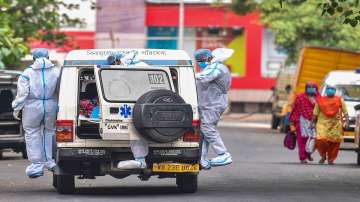A 32-year-old woman died of mucormycosis, commonly known as black fungus infection, becoming the first death due to the disease in West Bengal, a state health department official said on Saturday.
Shampa Chakraborty, a resident of the southern part of the city's Haridevpur area, was admitted to the Sambhunath Pandit Hospital with COVID-19. She was later diagnosed with mucormycosis, he said.
The patient, who was highly diabetic and was on insulin, died on Friday.
At present, five patients are undergoing treatment for the disease in the state and all of them are from neighbouring Bihar and Jharkhand, the official said adding, "We are constantly monitoring their condition."
Besides constituting an expert committee to deal with black fungus cases, the state health department has formulated an advisory, titled 'Mucormycosis - if uncared for - may turn fatal', for the common people.
The advisory mentioned warning signs of the disease such as pain and redness around eyes or nose, fever, headache, coughing and shortness of breath along with vomiting blood and 'altered mental status'- general changes in brain function like confusion, amnesia, loss of alertness and disorientation.
Those having health conditions such as uncontrolled diabetes, suppression of immune system by steroids, prolonged stay in ICU, comorbidities post-transplant and malignancy are prone to be attacked by the fungal disease, it said.
The advisory pointed out that nasal blockade or congestion, one-sided facial pain, numbness, blackish discolouration over bridge of nose or palate, toothache, loosening of teeth, blurred vision along with chest pain and worsening of respiratory symptoms are suspected signs of being infected by mucormycosis.
As people catch the infection by coming in contact with fungal spores in the environment, people have been cautioned against having exposure to decaying bread, fruits and vegetables, besides soil, compost and excreta.
"Wear shoes, long trousers, long sleeve shirts and gloves while handling soil gardening. People must maintain personal hygiene and thorough scrubbing is recommended while bathing," the advisory said.
The disease can develop after the fungus enters the skin through a cut, burn or other types of skin trauma.
The advisory said that use of masks is necessary especially during visits to dusty construction sites.
On the management of the disease, the health department has advised adherence to strict diabetes and diabetic ketoacidosis control as well as reduce steroids.
"Discontinue immunomodulating drugs and infuse normal saline before Amphotericin B (an anti-fungal medication) infusion. Patients should be monitored clinically and with radio imaging for response and to detect disease progression," the advisory read.
The blood-glucose level should be monitored post Covid-19 discharge as well as regular examinations to find any warning signs, it stated, besides mentioning judicious usage of steroid and antibiotics.
Latest India News

